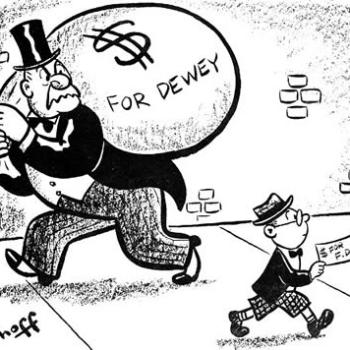Earlier, I linked to Adam Weinstein’s “Stop the Press Releases!”
I was reminded of Weinstein’s worries yesterday when uploading the pages for one of this week’s niche publications for the paper. It included an upbeat little story about a local college freshman who has put her studies on hold to pursue her modeling career (she’ll be on the runways in L.A.’s upcoming fashion week). The story, submitted through the paper’s “Get Published!” function online, was written by her mother. As with any story in our niche pubs, this was at least cursorily copy edited, and all the facts seem to check out. But none of those facts — to me or to Weinstein — seems quite as important as the single most salient fact about this short profile: It was written by the subject’s mother.
That raises at least two serious problems. First there’s the obvious journalistic problem here of a “reporter” who clearly ought to have been disqualified from covering this particular subject. Second, there’s the somewhat monstrous notion that any parent ought even to attempt to assess their own child with the detached, indifferent perspective that journalism requires.
On the latter point, I was pleased to see that our hometown mom failed miserably. The profile is anything but detached and indifferent — it exudes the unconditional love of a proud mother. That’s reassuring when it comes to the dynamics of this particular family, but it’s far from reassuring when it comes to the dynamics of the kind of “citizen journalism” newspapers are fumbling to embrace.
That was Weinstein’s point. “As newspapers recruit ‘citizen journalists’ to fill their pages,” he wrote, “flacks and hacks find an opening.” He points to other examples of newspapers publishing profiles written by family members and, far more disturbingly, of corporate profiles written by PR professionals hired by the corporations in question.
The Web 2.0-types say that Weinstein just doesn’t get it. His worries about this kind of collaborative “crowdsourcing,” they say, just stem from his instinctive defense of the old “fortress-newsroom” mentality.
Whatever. The bottom line is that newspapers have figured out that it’s much less expensive to be a “content provider” online if you don’t also have to be the content creator. The hype about collaboration with readers shouldn’t obscure the bottom line: Instead of acting like a restaurant, they’re trying to become more like a pot-luck church dinner. They don’t want to have to buy and prepare all of that food, but they still want to stick you with the bill when you’re done eating. That makes good business sense for the restaurateur, but no sense for the customers.
The seeds for this sort of thing were planted long ago as cost-cutting and down-sizing at newspapers led to the embrace of what used to be regarded as lazy shortcuts. Rewriting some corporation’s or nonprofit’s press release as a single-source article is already a widely accepted practice in most newsrooms. This practice has, again, come to be the main source of police reporting. Take the e-mail or fax from the PIO (the “public information officer” of the local police agency) and rewrite it as a “report.” Need a quote to flesh out the story? Call the PIO. The byline on this report will be the cop-beat reporters, but that person didn’t necessarily do any of the actual reporting. The reporter for the story was really the PIO — the government official. The person named in the byline simply performed what used to be called “rewrite,” back in the day when newspapers still had rewrite desks.
A mischief-making hacker piggybacking on a PIO’s e-mail account could get all manner of absurdities into print in almost any newspaper in the country. We wouldn’t have the resources or the procedures in place to do the kind of double-checking that could stop them. Nor would we have the inclination.
So since we’re already accustomed to adding our bylines to “reports” written by PIOs or by the press officers of local corporations and nonprofits, it’s only a short step to the kind of flack and hack “citizen journalism” that Weinstein decries.
Newspapers’ heedless, reckless and thoughtless rush to embrace this kind of “collaborative” journalism raises a few opportunities.
First there’s this opportunity to be innocent as doves: You can get almost anything in print, with little alteration and almost no qualification. Got a local nonprofit that needs some press? Take a photo and write up a short story and your local paper, grateful for the content, may publish it — almost verbatim — on its Web site or in its niche publications or even in the paper itself. Running a food drive? Collecting clothes or blankets for the homeless? Holding a fundraiser? Here’s your chance. Use it well.
Then there’s also this opportunity to be wise as serpents (or at least as wise-assed as serpents): Got an imaginary nonprofit holding an imaginary event? Curious how many fictional characters you can squeeze into a single semi-plausible local “event” (Central High School senior John Connor was awarded a $2,000 scholarship by the SkyNet Corporation …)? Have a favorite non-existent local hero you’d like to see profiled? Write it up, photoshop a picture, and submit it through your local paper’s equivalent of “Get Published!” The paper will likely still be grateful for the content and may still publish it — almost verbatim — on its Web site or in its niche publications or even in the paper itself.
This should be a Golden Age for pranksters, gadflies, clowns and da-da artists everywhere. The doors are wide open.
Such pranksterism needs no higher purpose to justify itself — ars gratia artis — but in this case it would also serve a greater good. If the clowns and merry mischief-makers can get enough beautiful absurdities published it might — might — begin to force newspapers to re-establish some of the old safeguards and procedures. And who knows? Maybe the skepticism they’ll be forced to adopt toward “citizen journalism” will carry over toward their reading of official pronouncements from government officials as well. If it’s not already too late.
















